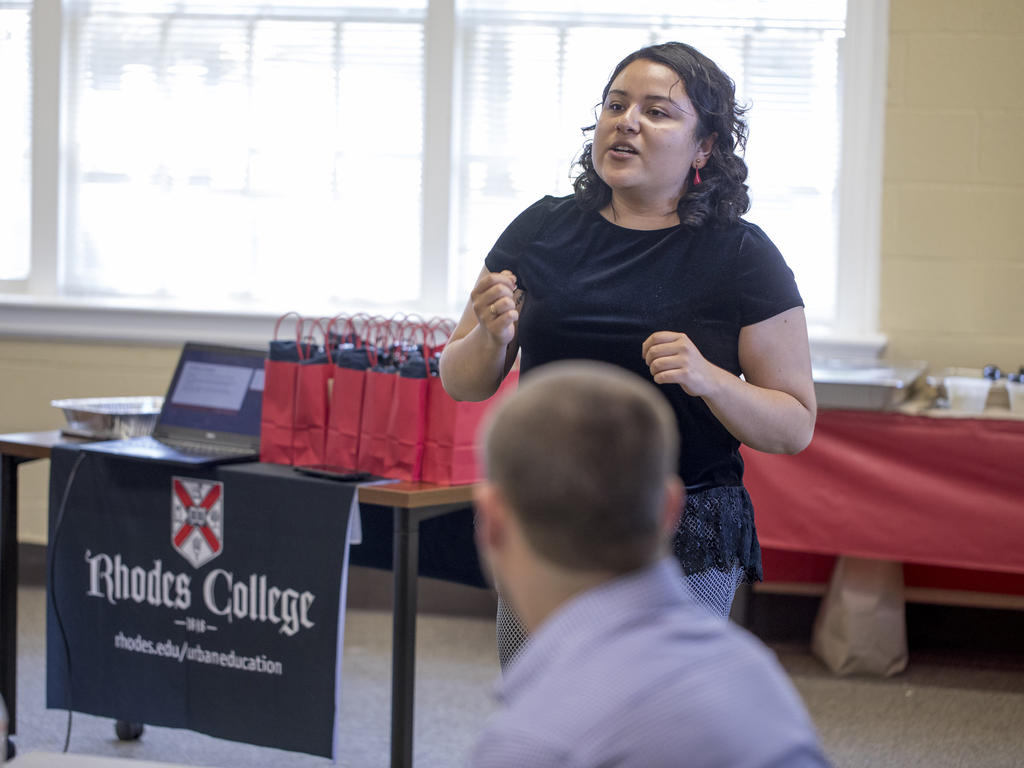By Zara Raezer '22
Introduced in 2018, the Master of Arts in Urban Education program is preparing its first cohort for graduation this August. For Diana Azcarate '19, the decision to join the program after graduating from Rhodes was simple. As a product of Shelby County Schools (SCS), Azcarate experienced firsthand some of the challenges public schools face today. She spent her time as an undergraduate studying systems of oppression and, upon graduation, was ready to challenge them. What better place to do so than within a classroom, in her home city? Azcarate’s time in the program prompted a period of reflection that has ultimately helped her empathize and better understand the needs of students sitting in SCS classrooms today.
Azcarate entered the Shelby County Schools as a 7-year-old, but was placed in a first grade class—despite having been a second-grader in Mexico. She was moved from her neighborhood school to another in the district so that she could take part in English as a Second Language (ESL) programming. The school district was quick—but inaccurate—in their assessment of Azcarate's abilities; she quickly tested out of ESL, and left the program her second full year in the district.
Azcarate thinks this was her first encounter with the phenomenon of tracking. Tracking, as she explains, takes many forms, both the discreet and the obvious, the helpful and the detrimental. This is a difficult reckoning for Azcarate, to both accommodate for her own hard work and drive as well as the role that tracking has played in her educational journey. Her test scores prompted a reconsideration of her abilities, and she went from being an ESL student to being placed in honors courses starting in middle school. Her teachers and counselors then viewed her as a gifted student, and it was only then that they expected her to have academic promise. From there, she met and exceeded all expectations placed on her by the school district. Azcarate hesitates to simplify her complicated educational history. Undoubtedly, her obvious drive and talent played a role in creating her own success. But, she asserts, it's difficult to know the extent that tracking has changed her academic future. Azcarate says that over the course of the master’s program, she's been “wrestling with the idea that, to some extent, my future was determined for me. I was tracked into honors programs, I graduated from college, and now I’m pursuing a master’s. So, in that sense, they were right.”
Per Azcarate, tracking lacks nuance. Individual teachers most often decide which students are "gifted," and which are in need of remedial attention. Citing a 2017 Vanderbilt study, Azcarate noted that white teachers are 50% more likely to recommend their white students to gifted and talented programs over their black pupils. In comparison, black teachers recommend their students at equal rates. Georgetown University estimates that over a lifetime, a college graduate will earn $1 million more than those with a high school diploma. If a student is never expected to step foot on a college campus, then they likely never will. Azcarate is cognizant of peers she left behind long ago.
This fall, Azcarate will be looking for her first teaching placement. Her time in the current cohort has given her the language to describe her educational experiences and the space to contextualize them. But even in high school, her teachers embodied successful urban educators. For most adults, there is that one teacher that helped change their life. Teachers who pushed them to do better and instilled confidence. For Azcarate, it was her high school chemistry teacher, who made it a priority to be available to her students. Teaching both regular and honors courses, her teacher had tutoring hours after school and even on Saturdays. They were open to all students. Azcarate remembers how much that mattered; how she respected all students and made chemistry accessible to all. She remarks that her teacher “was concerned with all of her students succeeding.” Azcarate aspires to be an educator of this caliber. Combining the example of her teacher's dedication to student success with the skills taught in the program, Azcarate hopes to emulate her former teacher. The Master of Arts in Urban Education program prepares its cohorts to be these educators, ready to move into the classroom and begin uplifting students with unique struggles.
But Azcarate is looking beyond being an educator, exploring the opportunity to pursue a master’s degree in educational policy. Azcarate quickly notes that urban teaching experience is severely lacking in today’s lawmakers and lobbyists. Experience is what gives a greater understanding of the system, and helps to craft practical and equitable solutions. Azcarate never denigrates the importance of individual teachers, but she says that the system doesn't support them in enacting greater change. Touching on the larger implications of failing public schools, Azcarate notes that “you can’t fix something that works the way it’s meant to.” She intends that her education career will be part of a greater effort to reshape public schools and will help create the students that will continue that work.
The Master of Arts in Urban Education program at Rhodes has turned an exceptional student into an inventive educator, whose own experiences have deepened her understanding of the concepts taught in her classes. Says Azcarate, “Every time I learn something new, I want to share it with anyone who will listen to me.” And, with graduation approaching this summer, she'll soon be able to do just that, taking her education into the classroom to work with tomorrow's brightest students.
